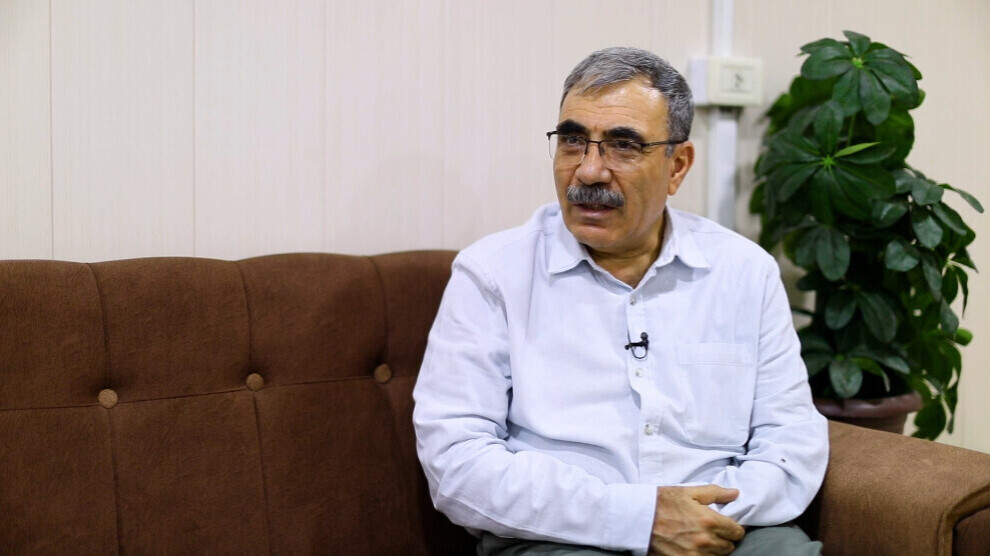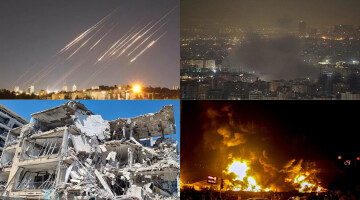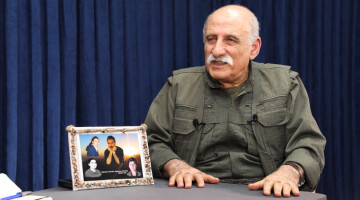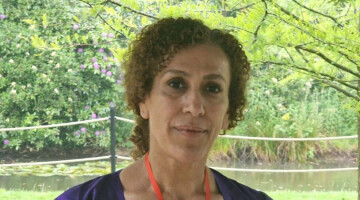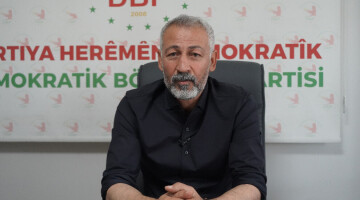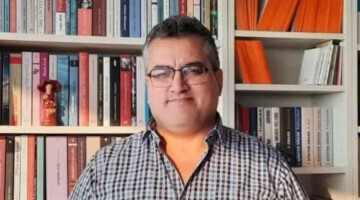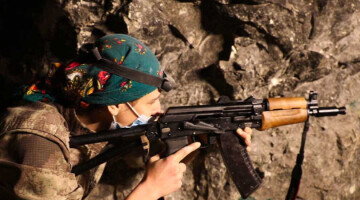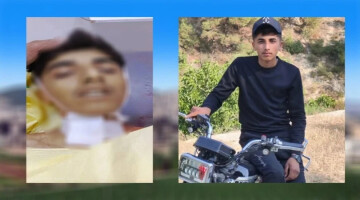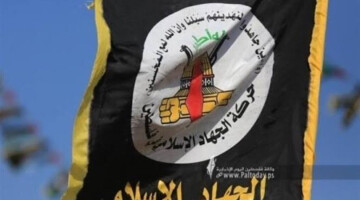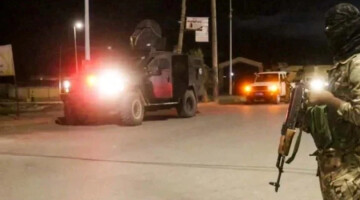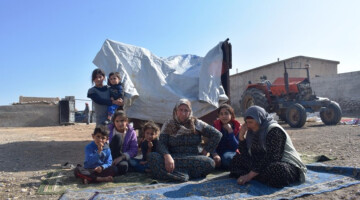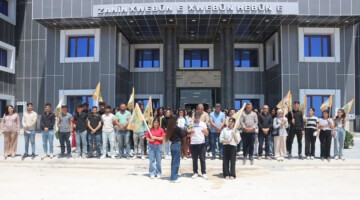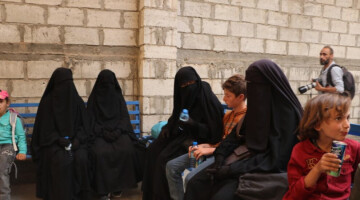PYD politician Aldar Xelîl spoke to ANF in Qamishlo about current issues. Xelîl gave an assessment of the Turkish state's continued attacks on Northern and Eastern Syria, the new strengthening of the Islamic State and the local elections in the autonomous region that have been postponed several times.
The Turkish state's attacks on the region continue. The occupiers are using all means to expand their attacks. What can you say about this?
The Turkish state and in particular the AKP-MHP regime sees its existence in the destruction of the Kurds. They see their existence in the liquidation of the democratic project. According to their logic, if the democratic nation project is implemented here and the Kurdish people get their rights and can live freely like other peoples, it will mean the end of the Turks. Why are they so afraid? Because the establishment of the Republic of Turkey was based on the annihilation of the Kurds.
Kurds and Turks founded that republic together. But what has the Turkish state done? It has forgotten its promises to the Kurds and pursued a policy of massacre and genocide. The Kurds were attacked and needed to be annihilated so that they would not demand their rights. The Turkish state has lived with this fear for a hundred years. The Kurdish people have legitimate rights. They have lived here for thousands of years and have their own history, culture and language. If you look at historical excavations and research, you can see the civilizations they have built in this region.
The Turkish state is afraid of this reality. It will be revealed that the Turks are not the owners of this region, that they came from outside and that they plundered and massacred Kurds, Assyrians, Armenians and many other peoples. This is what the Turkish state is actually afraid of. For this reason, in order to expand its occupation and extend its rule over all peoples, it sees the Kurds as its main enemy. It does not only want to preserve what it has, but also wants to occupy new territories. In this way, it believes it can protect its own existence.
The Turkish state thinks as follows: After the end of World War I, new maps were drawn in the region. According to these maps, the Ottoman Empire lost the territories it once controlled. The Ottoman Empire was destroyed. Today, the Turkish state plans to reoccupy the territories lost by the Ottomans during World War I. There is war and conflict in the region, and there is a security problem. The Turkish state wants to exacerbate this conflict and this environment of permanent instability. In this way, it wants to expand its territory in the region. Its goal is to build a great Turkey. And in doing so, it wants to kill two birds with one stone. On the one hand, the Kurdish areas are to be conquered, and the Kurds are to be exterminated, and on the other hand, the borders of the Turkish state are to be expanded. It wants to occupy Rojava and Başûr.
Since the beginning of the Spring of the Peoples, the Turkish state has been trying to prevent a new and different administration from being established here. It does not want a democratic system to emerge in Syria. That is why it supports jihadist groups and makes them work for it. It uses these gangs as mercenaries everywhere, from Somalia to Libya, in Azerbaijan and even in the fight against guerrillas. In Syria, the mercenaries are based in Idlib, Afrin, Girê Spî and Serêkaniyê, and they are kept ready and trained for further operations. The Turkish state does not want a democratic republic of Syria to emerge. Syria should remain in the hands of gangs forever because Turkey believes that this is how it can realize its Ottoman dream.
ISIS is encouraged by the attacks of the Turkish state and is also using the vacuum created by the war between Israel and Hamas to reorganize. Since the Autonomous Administration and the SDF are busy countering the attacks of the Turkish state, the fight against ISIS has weakened. International states claim that they are fighting Islamism, but they are silent about the Turkish state's attacks that are strengthening ISIS. How do you assess this situation?
ISIS is known worldwide as an extremist and fascist organization. It supposedly acts in the name of Islam, but it was created by these powers. With ISIS, the entire region has been destabilized. Everyone is doing politics through ISIS. Ten years ago, it controlled parts of Syria and Iraq. When the Turkish state directed it to Rojava, it was stopped for the first time in Kobanê by the YPJ and YPG. The whole world has seen that no one else was able to do this. Since the victory in 2019, no one cares about ISIS anymore. Everyone is now using it for their own politics. They place ISIS wherever they want and strengthen or block it at will. One of these powers using ISIS is, of course, the Turkish state. The secret leader of ISIS is Erdoğan, who is trying to strengthen and revive the terrorist organization under the current circumstances. His aim is to block the project of the democratic nation. He wants to prevent the project of freedom from spreading. The Turkish state supports ISIS, but not the project of the democratic nation, not the freedom of women and not the unity of peoples. It does this quite deliberately in order to continue its plans and projects through the Islamic State.
The local elections in North and East Syria had to be postponed several times and are now scheduled to take place on August 8. How should the elections be assessed?
As is known, the revision of the Social Contract was on the agenda for two years. A commission was formed consisting of 158 people from all sections of the population in Northern and Eastern Syria. At the end of last year, this new agreement was approved and announced. The Autonomous Administration will organize and restructure its system in accordance with this contract. One of the changes concerns the municipalities. In order for the municipalities to provide better services, a new system must be created. It cannot be that a single party comes and presents its own system. For this, all public institutions in the region must unite to shape their own municipalities. This has nothing to do with political issues and the unity of the country. It is about services. It is something that has to do with the life of society and depends on local conditions. But the Turkish state and its partners do not accept it. They are against the elections. Because if the local level is strengthened, people are better served. Problems are solved, the organization of society becomes stronger, local self-government is established. The Turkish state does not want that. It scares them and claims that the Kurds want to establish a new state and Syria will collapse.
The local elections are only a first step. The second and most important step is to restructure the councils and municipalities in order to decentralize the administration. However, there are shortcomings in the preparations. Some things could not be implemented in time. These are very practical things. Difficulties arise in every revolution. The elections should be held in a transparent and democratic manner and be an example of democracy.

